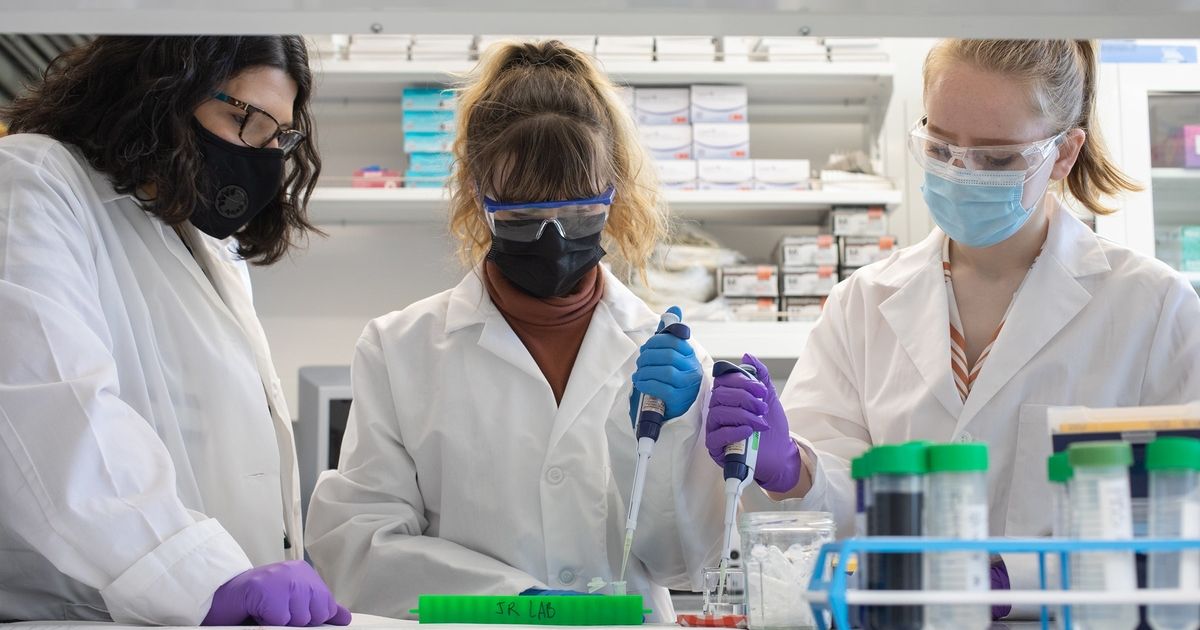Revenge of the dinosaurs
You mean revenge of the plankton?
Revenge of the dinosaur plankton
I wonder if micro plastics will be our generation’s lead.
Hopefully not as damaging…?
Hopefully not as damaging…?
Ha, maybe not directly but as ubiquitous as it is, we’re completely fucked. It’s everywhere and not going away. The damage has already been done, we’re just starting to examine to what extent.
It may be the next 100 generations’ lead.
Doubt it, men will become impotent by then. Testosterone levels are already halved compared to only a few decades ago
Nice, now show me a reliable source that has it 0ing out.
I hate that we keep running these massive experiments on ourselves.
There should be limited territories where people can go to use whatever new material they want, if they correctly capture and prevent the airborne spread of things. But otherwise civilization should remain within the boundaries of tried and true sustainable methods.
Them and chemicals in general.
Especially dihydrogenmonoxide!
Remember those stupid people in the past, drinking lead-poisoned water? At least we could just stop using lead in pipes when we found out it’s bad for us. Good luck finding anything to ingest without microplastics.
We literally replaced lead pipes with plastic pipes
We still have lead pipes in a number of places… its not like we snapped our fingers and all the lead pipes were magically gone.
In fact, the US government is giving out grants to states right now to help them remove lead pipes.
That’s true. I meant we stopped actively using them when building new houses. Though now that I think about it, even that is maybe not true everywhere. But at least it’s something you could change once you identify the problem. Microplastics have permeated everything, they can be found in the depths of the Mariana Trench. There is no getting rid of them (as far as we know).
Sure there is.
Its just not economically viable (meaning it won’t make anyone more money than not doing it), so its not going to happen anytime soon.
Not trying to be combative, but genuinely curious: What ways are there to remove microplastics from organisms?
All atoms in the biosphere cycle regularly aside from some very longstanding ones.
If you identify the chemical makeup of the monomer (corroded plastic, micro plastic, whatever you want to call it), there’s nothing stopping you from hypothetically finding or creating enzymes which can digest it. The only reason it hasn’t happened naturally yet is due to a lack of evolutionary pressure to digest the weird compounds we’ve been making up until now.
Set up farms of modified mycelium or bacteria to scrub the plastics, and stop using many or set up required end of life treatment for plastic manufacturers, and you’ll very rapidly make a dent in plastic spread.
Further, modify wild biota, such as mushrooms, bacteria, etc to have the ability to produce the same enzymes for assisting in cleanup.
Big project, yes, but technically feasible. We’ve done more extreme things.
I’d just point out that these microorganisms will definitely escape into the wild at some point and then durabilty for plastics will be similar (maybe?) to that for wood (there was also a period in time when trees evolved when microorganisms had to catch up to degrade it, presumably it was full of wood everywhere that just wasn’t rotting).
Imagine a future where your PC screen or mobile phone has an expiry date and it’s not due to planned obsolescence. Maybe that’s not so bad after all, now that I think about it.
Well I recommended modification of wild biota anyway so yeah, that’s the idea.
I live in a 70 year old wood framed house with a 20 year old wooden desk, walk on 30 year old wooden floors, have 15 year old wooden doors…
Meanwhile I’d easily wager 80% or more of plastics have a dwell time once deployed of a few days.
In reality, without being in relatively harsh conditions, it’s unlikely for plastics to degrade very quickly even with highly effective digestion.
I’m not saying any of this is untrue, I’m saying consider the domain name of your news source too.
It’s not like they don’t link the study ;)
Interesting read, I guess testing on mice is all you can do the behavioral part. But the methods section doesn’t state any weaknesses, I know it’s nor required but you know.
At the end of the 3-week-long exposure, behavioral testing began. During the open-field test, mice were allowed to explore a low-lit chamber for 90 min with spontaneous movements monitored in the x-, y-, and z-directions. Several parameters to measure behavioral performance were recorded, including distance traveled, rearing activity, and duration in the center. Surprisingly, we found that acute exposure to PS-MPs induced an increase in distance traveled, which was more pronounced in older animals (Figure 3A–D). Similarly, both young and old PS-MP-exposed mice reared significantly more in the open-field, as compared to age-matched controls (Figure 3E–H). Young PS-MP-exposed mice did not spend more time in the center of the chamber overall (Figure 3J), but both low- and high-dose groups spent more time in the center when analyzed as a function of time (Figure 3I). Low- and medium-dose older animals also showed an increased duration in the center (Figure 3K,L).
I share your concerns regarding the domain name (alleviated by linked study) and methods.
I’d just like to add that, at least for me, the alarming part is regarding the distribution of these, they seem to be not only lipophillic (which would be expected, considering the nature of them), but also able to cross the blood-brain barrier, something evolved in order to keep bad stuff out (sure, the lipophillic nature explains that part as well, but presumably the fact that they are undissolved but basically very small particles, there was probably some hope towards them not being able to cross).
To me, this raises some questions regarding what else travels with them, and are they inadvertently becoming a vector for stuff that would normally be more easily disposed of? Thinking of things like the first pass effect here, in the liver where things like ‘naked’ pollutants would be processed/eliminated ‘on sight’; then, if something comes along adsorbed/absorbed into a 3D structure that hides it from the body long enough and then reaches the brain, that something could be potentially leached in a highly unfortunate place. Think targetted drug delivery - only random and with whatever happened to be around while the microplastic was forming.
Add to this the fact that any and all studies lack a control group since the things are in everything and everyone. Would it even be possible to grow plastic-free lab animals to test them? How would you even isolate the area without using any sort of plastic?
I predict that behavioral studies are more likely than not to show erratic results due to having different baselines of comparison for each subject because of the heterogeneity of contamination, so even spiking with the same agent in the same manner, you’d be either compounding an effect, potentially countering another or perhaps just eliciting a totally different response. How would one control for that? Maybe get as uniform a starting group as possible but how would you prove that uniformity?
I’m imagining a world where humans live under the spell of microplastics like leaf cutter ants are hypnotized by fungus.
Oh wait, we already needlessly dig up fossil fuels for the plastic overlords despite all better judgment
Praise be the Oil God, Exxon.
Fuck you heathens. Only Shell is the one true Lord!!
B.utt P.lug for life!!!
Sacrifice humans to the sacred alter of Exxon
The oil must flow!
I’m absolutely not surprised.
Well that’s absolutely horrifying.
That’s why I chose to ignore it. What am I gonna do about it
Whatever it takes to get governments to listen.
Violence
Push your local politicians to take steps in the right direction.
unfortunately the study says nothing about the impact on behavior. some mice “traveled farther” or “spent more time in the center” but no behaviors were reported that had meaningful implications on human behavior.
I think that’s not something you can usually extrapolate from mice, way too different. The interesting part is only that it resulted in some behavior changes.
I often see articles about the effects of microplastics, but I have yet to see or read about the best steps we can take to combat them.
Can anyone recommend some content that describes ways to reduce exposure or share the most effective ways there are of reducing microplastic exposure?
The two largest sources of microplastics are clothing and car tires. Clothing is a pretty easy fix. Only buy natural fibers like cotton, wool, etc. For car tires you will have to drive less. These two sources account for more than half of microplastics.
Natural fibers are often outside the price range of the average person. Until prices come down or wages go up, people will keep wearing polyester clothing.
For tires, I’m hopeful that technology will improve the composition of tires, or even make them out of a modified form of natural rubber, but switching most transport to rail seems like the superior option here.
??? Cotton is usually the cheapest thing I see.
Even natural rubber makes microplastics.
Companies love to charge a premium for cotton here (Canada). I try to get Cotton, Linen and Hemp as much as possible, but I end up paying $80 for a t-shirt instead of $30.
Don’t heat food in plastic in the microwave. Put in the effort to put it in glass or a plate or so, then heat.
Don’t store hot leftovers in plastic.
Don’t buy and drink plastic bottled water.
If you can in the stores in general chose between food and drinks packaged in glass or cardboard vs anything else: chances are glass or cardboard packaging is the healthier choice. Aluminum cans should still be okayish too, tho they possibly layered it with plastic inside too depending on the pH of the contents to slow down reactions between can and product.
Ban plastic. There is literally no other way. Nothing you do on an individual level will have the slightest bit of impact at all. Government has to treat plastic like Freon/DDT or any other chemical that was banned world-wide because of huge unexpected impact.
They can’t ban literally all plastic; it’s irreplaceable in some medical applications.
It’s also likely an uneccessary nuclear response to the situation. I doubt every plastic is as bad, do studies and ban the worst/least useful plastics and work your way from there.
I mean synthetic textiles alone make up almost half of the plastic in the ocean.
It’s irreplaceable in a lot of applications. There’s a reason we’re using so much of it. Even in applications where it can be replaced, doing so would result in burning more fuel to transport the other, heavier material, accelerating global warming. Lose-lose.
Previous studies have suggested that GFAP expression might decrease in early stages of some neurodegenerative diseases, such as Alzheimer’s disease, or in younger patients with depression disorders.
So Alzheimer’s or depression, eh? So if I have chronic depression am I safe from Alzheimer’s or am I going to be depressed and constantly forgetting my medication?
deleted by creator














